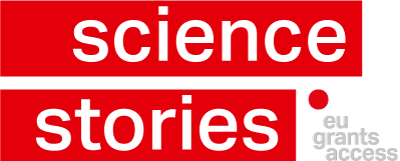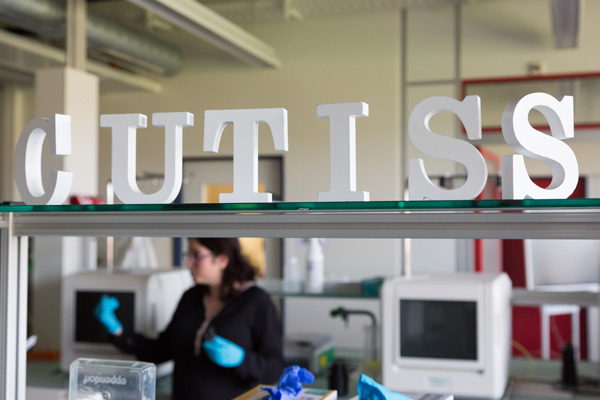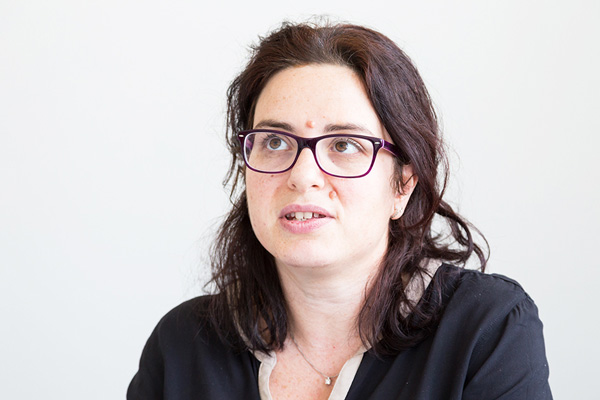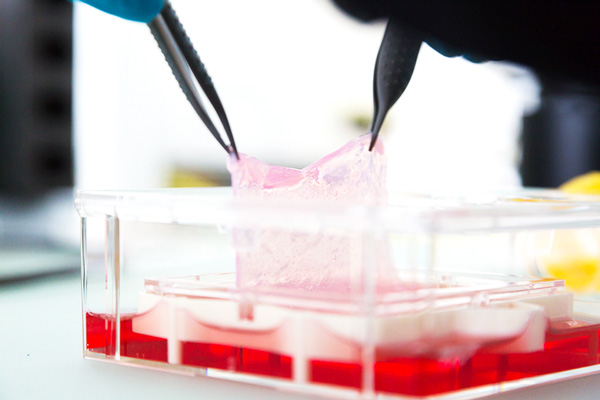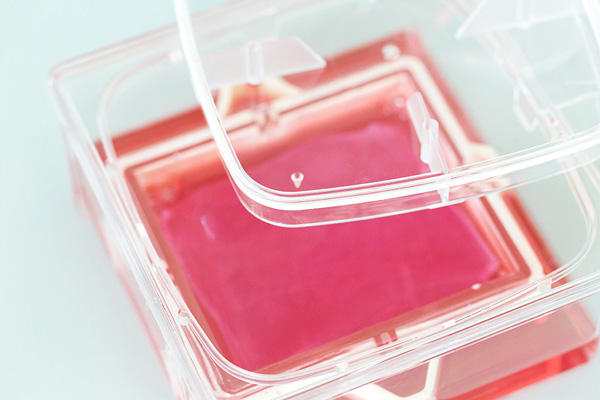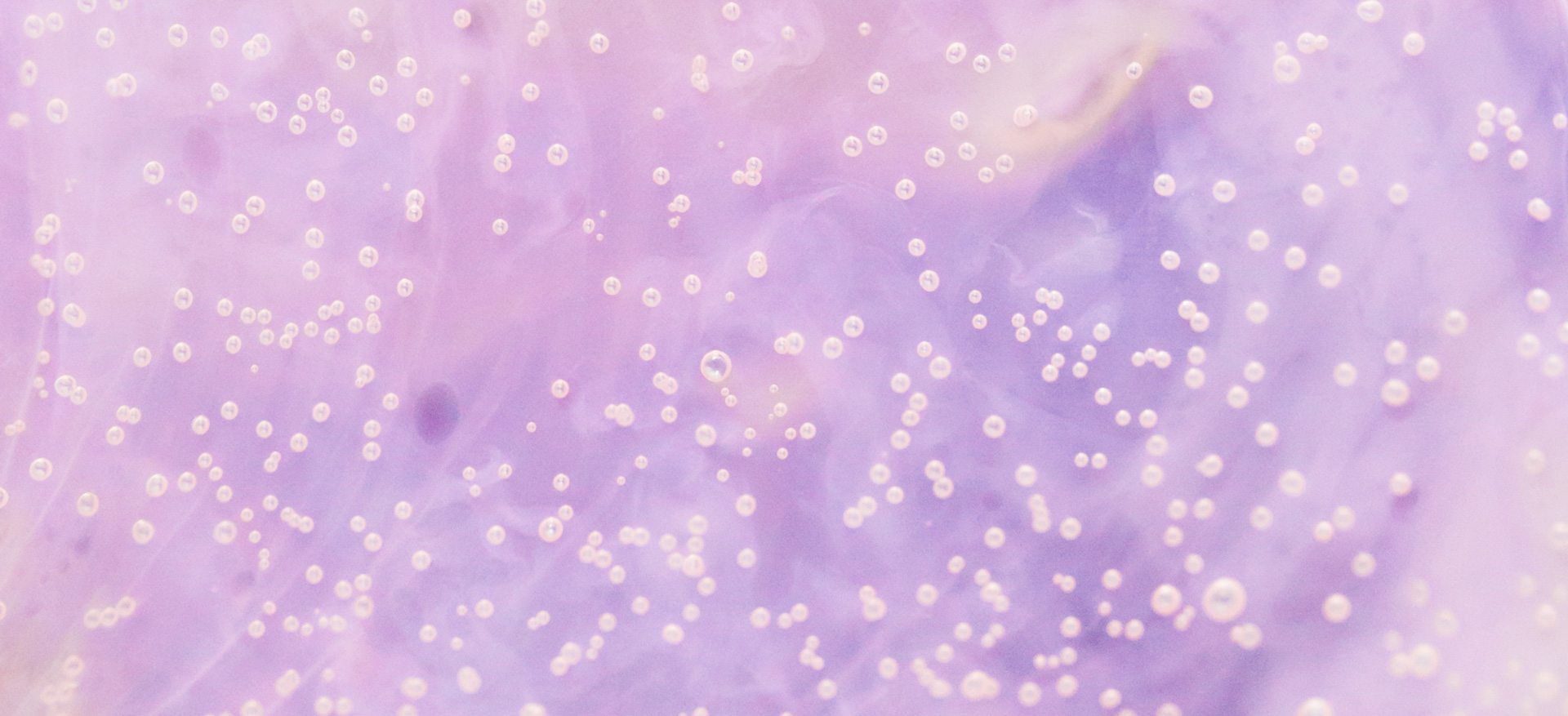
On the way from lab to skin factory to hospital
Ernst Reichmann and Daniela Marino developed a replacement skin in the laboratory which gives hope to millions of people suffering from burns or other severe skin defects. The novel personalised, smooth and soft replacement skin could enhance their quality of life significantly.
A shared vision brought them together: Ernst Reichmann and Daniela Marino want to enable children (and adults) with severe and deep skin defects to lead a better life that is as painless as possible. In the lab and over the course of the past ten years, they have refined together a human skin that shall feel like one’s own. After a promising initial clinical trial phase, Daniela Marino leads this replacement skin into testing phase II with a start-up company founded especially for this purpose; meanwhile Ernst Reichmann, who is a researcher through and through, wants to further bring his «lifetime achievement» to perfection. Several EU projects, the University of Zurich, private sponsors and their own patience supported them on their way up to this point.
Around 50 million people around the globe suffer from severe skin problems caused for example by tumours, congenital malformations, chronic ulcers or extreme burns. Extensive burns are life-threatening. Because of the missing protective skin microorganisms can enter the body and the liquid and thermal regulation no longer functions. Today, burns are treated by harvesting healthy skin from the patient’s body to cover the defect. Usually, only the uppermost skin layer is used, the so-called split skin. It is composed of the epidermis and a thin layer of the dermis. The transplantation of this commonly called thin split skin, which has to manage without sufficient dermis, often leaves the patient with visible and debilitating scars. The grafted skin looks out of place and the graft does not grow with the changing body of a child: Especially for children this is a «great sorrow», Daniela Marino states, being the mother of two herself. «Although we have this state-of-the-art, highly technical medicine, we still have not been able to solve these problems.» This is just what Reichmann and Marino want to change.
«No one truly believed
in the development of
a clinically applicable,
personalised skin.»
Ernst Reichmann
Daniela Marino is an energetic woman. The 37-year-old, who grew up in Agrigento in Sicily, talks quickly and with her hands, she is constantly moving. Her hands-on attitude has been beneficial to her professional career and her vision. Already as a child she had wanted to become a researcher and she went on to study biotechnology in Milan and obtain a doctorate in pharmaceutical sciences from ETH Zurich; she then joined the Tissue Biology Research Unit established by Ernst Reichmann at the Department of Surgery of the University Children’s Hospital Zurich. Together with Reichmann and his team as well as group of physicians at the University Children’s Hospital Zurich she developed a novel skin that improves the lives of children with most severe burns. The production of this personalised skin is patented; the skin grafts are called denovoSkin which means «newly created skin».
He started from the bottom 20 years ago
For the past 20 years, Ernst Reichmann, who had worked in cancer research, has been refining better replacement skin products. In 2001, he started to establish the Tissue Biology Research Unit to this end. In the lab, Reichmann and his team produce personalised skin. Thereby, they take a piece of the patient’s skin the size of a stamp. The different skin cell types are then placed in a nutrient solution inside an incubator at 37 ºC and reproduced in great quantities– until the stamp has transformed into skin grafts of seven by seven centimetres and a thickness of one millimetre. «This skin replacement is already very similar to human skin,» Reichmann states. It is «soft and smooth» and thus it is very adaptive and grows easily which prevents severe scarring. The first clinical trial phase with ten patients at the University Children’s Hospital Zurich was concluded successfully by the team in 2016. All of the children tolerated the novel skin developed in the lab well, according to Reichmann, none of them rejected the grafts which also did not have any other additional negative consequences for the children. «The skin has thus proven clinical safety,» Reichmann confirms.
The fully dedicated researcher still has strong memories of the early days of «Tissue Engineering» or «Skin Engineering», as the production of tissue or skin in the lab is called, almost 20 years ago in Zurich. «We started with a small team. No one truly believed in the development of a clinically applicable, personalised skin.» Already at that stage, Reichmann had to find the money for his research all by himself. «Participating in the EuroSTEC Project within the scope of the EU’s 6thFramework Programme with 800,000 Swiss francs made the decisive development of our research possible in the first place. Without these funds, our endeavours would have ended there and then.»
Significant progress thanks to a six million euros EU project
In 2009, Daniela Marino joined the team as a postdoc, two years later the two of them were awarded six million Swiss francs during the EU’s 7thFramework Programme for the coordination of the EuroSkinGraft Project. It was only thanks to this large financial support that other significant funds came in addition as well. During this project, which was concluded in 2016 with the clinical trial, Daniela Marino took on more and more coordination and organisation tasks. She was no longer a mere researcher but a manager as well and she enjoyed this so much that her entire career took an unexpected turn: The passionate researcher became a passionate entrepreneur.
Establishing a spin-off company
Together with Reichmann and Martin Meuli, Chairman of the Department of Surgery at the University Children’s Hospital Zurich, she founded upon closure of the EU project in 2017 the company called Cutiss AG. The Latin word «cutis» means «skin», the suffix «-tiss» with double-s refers to the English term «tissue». The road from basic research to the marketable product is long and costly, yet inevitable, Daniela Marino states. «We had to found a company in order to produce large amounts of replacement skin under clean-room conditions in the future and to acquire investors for our next steps.» Daniela Marino is the start-up’s CEO. Not least thanks to her enthusiasm Cutiss quickly attracted plenty of attention and won several innovation awards. In addition, the Wyss Translational Center Zurich (abbreviated Wyss Zurich) is supporting the team with five million Swiss francs to avoid the impending threat of the «valley of death» caused by great costs for further clinical trial phases and the development of the company.
Cutiss was picked from 1644 contestants
Cutiss AG has been very successful ever since its founding days. Also, the company was picked for phase II at SME Instrument. During this phase, outstanding and promising start-ups are funded with up to 2,5 million euro each. This SME tool is part of a pilot scheme by the European Innovation Council (EIC) which aims at supporting companies during pilot projects or so-called scale-up processes, the automated product manufacturing and quality assurance. Out of the 1644 contestants from all across Europe only 63 were picked, three of them from Switzerland, one of these three being Cutiss AG with its skin graft denovoSkin. On its way to market authorisation, the novel skin transplant is currently passing through international clinical trials of phase II. The skin produced in the lab has to be tested on yet more patients. For this, Cutiss collaborates with four hospitals in Switzerland and abroad, as the researchers require about 40 patients, both adults and children. What is more, the start-up has to prove that it is capable of producing a larger number of skin grafts within a short amount of time. «We now have to automatise production,» Daniela Marino says. «Cutiss has to turn into a skin factory in order to supply hospitals with these skin grafts in the future,» Ernst Reichmann gets to the heart of it. The next two years are of vital significance for both Cutiss and the future of denovoSkin.
«It takes patience»
Giant expectations are placed on the personalised replacement skin denovoSkin. Numerous media and scientific journals have already celebrated the new procedure and speak of an enormous potential for people with burns or skin defects. Accordingly, the pressure on the start-up is huge. And yet, Ernst Reichmann says, whose simply furnished office at the Bio-Technopark in Schlieren is labelled «brain cell», it takes much patience and diligence when developing new pharmaceuticals. Already ten years ago, the American Steven W. Boyce clinically applied a replacement skin, yet the process had to be stopped by the US Food & Drug Administration because of grave clinical misconduct. «There is a risk of skipping due diligence criteria for the sake of profit as soon as a medical development leaves basic research to become a commercial product,» Reichmann says.
«We had to found a company
in order to produce large amounts
of replacement skin under clean-room
conditions in the future.»
Daniela Marino
Daniela Marino is good at dealing with pressure. She does admit, though, that every once in a while she wonders whether denovoSkin will be able to meet the great expectations. «What if the clinical trials show that the novel skin, after all, is not as great as we hoped for?» But then she recalls for how long and with how much diligence Ernst Reichmann and his team have been working on this project and how successful they all have been during the past years.
While Daniela Marino has become an entrepreneur with body and soul, Reichmann is glad that he can continue to be a researcher. He is not keen on profit-oriented thinking and the pressure that comes with commercialising a product as fast as possible. He wants to create «the perfectly functioning skin» and develop it even further. «This is my lifetime achievement,» he states. He wishes to create a skin in the lab that comes very close to our natural full-thickness skin, a thicker piece of skin with neural cells, pigmentation, blood vessels, maybe even hair follicles and sweat glands. denovoSkin is a kind of full-thickness skin, epidermis and plenty of connective tissue, but without pigmentation and blood vessels. Reichmann and Marino are convinced that this skin will be a blessing for many burn victims because it adapts very well to the injured body. However, there will probably be another two years until market maturity. «It takes patience,» Daniela Marino sighs.
Interview with Daniela Marino
Ernst Reichmann and Daniela Marino
Prof. Dr. Ernst Reichmann’s roots are in cell biology. The 63-year-old researcher has worked for 20 years at renowned cancer research institutes before he started his second career in 2001 at the age of 45 at the University Children’s Hospital Zurich. There, he established the Tissue Biology Research Unit (TBRU). Reichmann is a passionate researcher whose goal it is to produce a personalised replacement skin in the lab that comes as close as possible to the patient’s natural skin. During the past years, however, he has turned more and more into a scientific manager, he recounts. Because he wants to advance his vision, he has to acquire funds, write project proposals, organise projects, establish cooperations with other researchers and institutes. The biotechnologist Daniela Marino, who helped to develop together with Reichmann and the University Children’s Hospital Zurich the novel replacement skin denovoSkin and coordinated the six million euros project EuroSkinGraft, is the co-founder and CEO of the start-up company Cutiss AG with now 18 employees. Cutiss was picked from over 1600 contestants for phase II of the SME Instrument, a pilot scheme by the European Innovation Council (EIC). This project aims at supporting promising start-ups with up to 2,5 million euros. Within the scope of this SME project, Cutiss plans to conduct the second clinical trial phase for denovoSkin with more patients and to automatise the production of the skin grafts. Both Ernst Reichmann, who continues his commitment to basic research to create «the perfect replacement skin» and Daniela Marino and her team work in their laboratories at the Bio-Technopark in Schlieren near Zurich.
SME Instrument
is a funding instrument of the EU that supports highly innovative Small and Medium-sized Enterprises to develop novel products ready for the market. Its main goal is to help promising innovations reaching market maturity and thereby to create growth and jobs. The SME Instrument is funded and administered within the scope of the EU Framework Programme for Research and Innovation, Horizon 2020.
